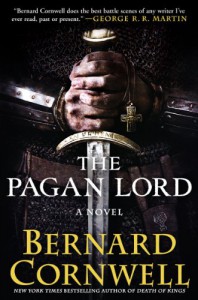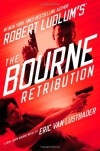Review: The Pagan Lord

When Bernard Cornwell is on form, he can be at least as good, if not a whole lot better, than most everyone else. When he's ticking over, he's also a whole lot better than a whole lot of other writers in the Historical Fiction field. And while there's no doubt I enjoyed The Pagan Lord and thought it was very good, it does have the sound of Bernard Cornwell ticking over. I thought Death of Kings was an excellent book, but it doesn’t seem that Cornwell has used that as a transitional book to take Uhtred to better places, character-wise, or style-wise. I enjoyed this, don’t get me wrong. But I think BernardCornwell is a little on autopilot at the moment. In many ways, Cornwell is rather like the mood that radiates off Uhtred in The Pagan Lord - smart, cunning, savvy, clever. He's been there, done that. Many times. But he’s also irritating. Why? Later.
It goes wrong for Uhtred, the 'Pagan Lord' of the title, from the beginning (actually, I’d like BC to give us an idea of how we’re supposed to pronounce ‘Uhtred’ in our heads while we’re reading this. Idea?) Uhtred goes to try to capture his son, to stop him from shaming the family name and becoming a priest. Of Christ, not Uhtred’s Odin. Uhtred is, understandably for an old-fashioned, died in the wool Viking, somewhat less than chuffed at this development. He tries to reason with his son, threatening to cut him off, as it were, but he instead almost accidentally manages to kill another priest. As you do. Uhtred most likely normally wouldn't lose much, if any, any sleep over this sort of thing. But itisn’t the sort of thing that is going to endear him to his Christian neighbours. To make matters worse, he then returns home to find his hall has been attacked and burnt to the ground by Cnut Longsword, while he was away. He decides to meet with Cnut, only to find that Cnut thinks Uhtred has taken his (Cnut’s) wife and son. Which he hasn’t. And he suspects a double-cross. He returns home to find his peace-loving Christians neighbours have burnt down what remained un-burnt from the last burning. As you do in 10th Century pre-England. So, as he can’t convince anyone to trust him when he says there is treachery afoot, Uhtred’s not in the best of moods at the start of The Pagan Lord. Dark days for Uhtred and it doesn’t get much better.
Dark days indeed. And whaddaya know? There’s bad weather. Nearly all the time. Cornwell clearly wants us to get the message that the weather matches Uhtred’s mood. But that really is a bit too obvious for a writer of his calibre, isn’t it? And it’s all the bloomin' time. I could be wrong on this but, I can’t actually remember there being good, or even fine, weather in any of Bernard Cornwell 'Warrior Chronicles' books. And there isn’t here. For instance, when he’s sailing off in his ship, 'Middleniht’, there's 'grey sea, grey sky and a grey mist, and the 'Middelniht' slid through that greyness like a sleek and dangerous beast.' I'm all for the weather as a way of mirroring a mood, but when it's all the time, the time comes when you have to say 'enough already with the dreadful weather!' Obviously it’s England we’re talking about here, so it is going to rain more than most places in the 10th Century, but they had sunshine back then as well! Even in the North Sea. It was on occasion dry and mild in the 10th Century, the sleet in the middle of summer didn't always come at you horizontally. But when the book opens with 'A dark sky. The gods make the sky; it reflects their moods and they were dark that day. It was high summer and a bitter rain was spitting from the east. It felt like winter’, you just think ‘oh, here we go again’. Actually, the only time I can think of in The Pagan Lord when he gets good weather, is when he actually wants bad weather! Obviously as cover for a dastardly deed.
Having said all that, the weariness, as befits an old man - old for the Viking age anyway - the ’not again, I'm too old for this shit’ of Uhtred, is outstanding. Understandable, given his luck with Christian sons - Christians on general - and inflammable barns and houses, really. He’s a believable and sympathetic character and one Cornwell obviously loves. That comes over loud and clear. Uhtred is, if I’ve read rightly and with only a couple of historical ‘adjustments’ along the way, an ancestor of Cornwell's. Would explain why.
So, my really big problem with this one?
And.
And. And, and, and. And. Ands, every-bloody-where. In sentences, starting sentences, linking sentences. Ands after commas. Ands starting paragraphs, for goodness' sake.
And way too many of them.
Cornwell achieves the matter of fact, authoritative style of Uhtred’s narrative, through using 'and' as a link in sentences. Like this:
"He (Æthelred) wanted the poets to sing of his triumphs, he wanted the chronicles to write his name in history, and so he would start a war, and that war would be Christian Mercia against Christian East Anglia, and it would draw in the rest of Britain and there would be shield walls again.”
Makes events that follow an and appear inevitable, no other outcome could possibly have happened. Makes it seem like the character of Uhtred is very decisive, knowledgeable and authoritative. Fine a few times. However, the constant, almost metronomic use of ‘and’ like that and too much, becomes irritating. And, time and time again - like the bad weather - enough! Try another approach once in a while. It really became a problem for me reading the book. Like it was standing in the way of my enjoying the book to the full. Like I would have done, if there were less ands. In the end, I was looking out for them and becoming more and more irritated. Starting sentences with an and is wrong, grammatically. You know it. Starting a paragraph with one is a real no-no.
"And I was a warrior, and in a world at war the warrior must be cruel.”
Like that. Still on the statute books as being punishable by a blood-eagle, if I’m not much mistaken. Unless you’re writing advertising copy. Then it’s ok. But this is a book, a decent one, this is Bernard Cornwell and he should know that it’s not ok.
And because he used it as a device so frequently, without seeming to even try to consider the maybes of any other kind of approach, is why I felt he was on autopilot, not really worried or thinking about it. Maybe he was thinking of the next Sharpe? I think if you only read Cornwell, you’d imagine that this is both how Historical Fiction is done and as good as it gets. Anyone who has read a few of the (now) many (many) other excellent writers on Cornwell’s block, like me, know different. Like I said, this is good, but while there is much to admire and recommend, I still came away from it feeling it could have been better. I’m no writer (that’s not news to you?), so I couldn’t for the life of me tell you how he should improve, but I just put it down at the end - even with the bombshell - and thought ‘ho-hum, autopilot’.




